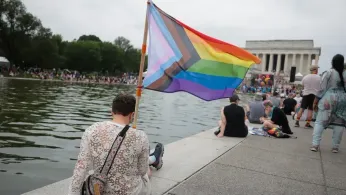
2 hours ago
WorldPride D.C. Attendance and Economic Impact Far Lower Than Anticipated
READ TIME: 3 MIN.
WorldPride D.C. 2025, envisioned as one of the largest LGBTQ+ gatherings ever held in the United States, concluded in June with a reported attendance of approximately 1.2 million people. This figure, announced by Destination D.C., is only about a third of the original forecast of 3 million, signaling a significant shortfall in both visitors and anticipated economic impact for the nation’s capital .
Organizers had hoped that the event, coinciding with the 50th anniversary of Washington’s first Pride march, would bring together a record number of global participants and generate close to $800 million for the local economy. However, economic impact estimates have since been revised downward to reflect the lower attendance and a softer-than-expected demand for travel and accommodations .
Several factors contributed to the reduced turnout. According to Destination D.C., overall hotel occupancy during the peak weekend was down 3% compared to the same period in 2024—a notable decline given the scale of WorldPride celebrations . The downturn was felt citywide, with local businesses and hospitality providers missing out on the anticipated surge in demand.
A climate of uncertainty and concern for safety was repeatedly cited by participants and officials. Washington Mayor Muriel Bowser publicly acknowledged that some visitors “feel scared that an environment is developing that is anti-LGBTQ… but we can’t live in fear, we have to live our lives be as best prepared as we can” . These sentiments reflect broader anxieties in the LGBTQ+ community amid heightened political tensions and recent legislative setbacks.
The economic ramifications of the attendance drop were immediate. Initial forecasts from January envisioned an influx of tourists and overnight guests contributing hundreds of millions to D.C.’s economy. Instead, Destination D.C. reported that the final economic impact would be less than one-third of early projections—a gap felt by hotels, restaurants, and retail businesses, many of which had invested heavily in preparation for the event .
“WorldPride was an incredible celebration that honored and advocated for the global LGBTQ+ community,” said Kyle Deckelbaun, senior manager for Domestic Media Relations at Destination D.C., in comments to the Washington Blade. “Early indicators point to a successful event, but numbers are not fully in yet. Capital Pride, Destination D.C. and partners are still gathering data across all the events of WorldPride. The full economic impact report will take some time” .
Despite the setbacks, organizers, activists, and local officials have emphasized the enduring importance of Pride and the need for solidarity in challenging times. The weeks-long celebration featured more than 100 events, from parades and street festivals to advocacy workshops and cultural showcases, drawing participants from across the United States and around the world .
Many in the LGBTQ+ community interpreted the lower turnout as a call to redouble efforts around advocacy and inclusion. “We have to keep showing up, even when the numbers aren’t what we want,” said one attendee at the closing rally. “Visibility and community matter more than ever.”
Destination D.C. and Capital Pride have committed to a thorough review of event logistics, marketing, and outreach strategies, aiming to identify barriers that may have discouraged participation—particularly among international visitors and marginalized groups within the LGBTQ+ community .
As organizers await a full accounting of economic and demographic data, WorldPride D.C. 2025 stands as a complex milestone: a testament to community spirit and resilience under pressure, and a reminder of the challenges facing LGBTQ+ gatherings in an evolving political and social landscape.
Experts suggest that future Pride events must prioritize safety, accessibility, and inclusive messaging, while also adapting to shifting patterns in travel and community engagement. Partnerships with local law enforcement, mental health organizations, and advocacy groups are expected to play a larger role in building trust and ensuring the well-being of all participants .
For now, the LGBTQ+ community in D.C. and beyond continues to reflect on the legacy of WorldPride 2025—not just in terms of numbers, but in the ongoing fight for equality, safety, and celebration.






